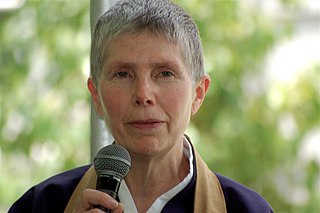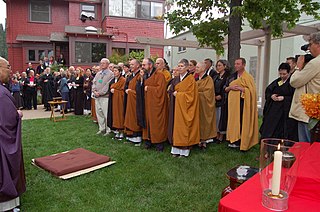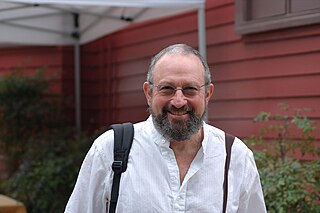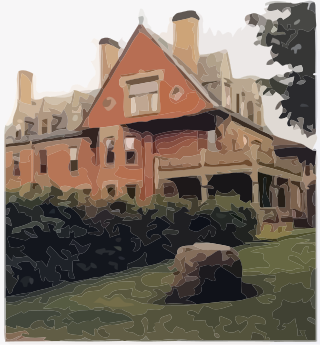Kyozan Joshu Sasaki, Roshi was a Japanese Rinzai Zen teacher who lived in Los Angeles, United States since 1962. He was one of the most influential but also controversial Zen masters in America, "coercing hundreds of [students] into having sexual contact with him" since at least the early 1970s. He sought to tailor his teachings to westerners, opening dozens of centres, and founding serving as head abbot of the Mount Baldy Zen Center, near Mount Baldy in California, and of the Rinzai-Ji order of affiliated Zen centers.

The term American Buddhism can be used to describe all Buddhist groups within the United States, including Asian-American Buddhists born into the faith, who comprise the largest percentage of Buddhists in the country.

Kanzeon Zen Center was a Zen Buddhist center located in Salt Lake City, Utah. It was an affiliate of the White Plum Asanga, an association of Zen centers stemming from the tradition of Taizan Maezumi. The founder and Abbot of Kanzeon Zen Center was Dennis Genpo Merzel Roshi, who resigned in 2011 amidst controversy. Kanzeon Zen Center was the home temple and the hub of Kanzeon Sangha International, founded by Genpo Roshi in 1984, with affiliate teachers, centers and groups in the US and seven European countries. The center was housed at 1274 E. South Temple, a historic building listed as a contributing property in the South Temple Historic District. It closed in the wake of the sex scandals involving Merzel. News reports stated that the center was deeply financially in debt to Merzel.

John Daido Loori was a Zen Buddhist rōshi who served as the abbot of Zen Mountain Monastery and was the founder of the Mountains and Rivers Order and CEO of Dharma Communications. Daido Loori received shiho from Taizan Maezumi in 1986 and also received a Dendo Kyoshi certificate formally from the Soto school of Japan in 1994. In 1997, he received dharma transmission in the Harada-Yasutani and Inzan lineages of Rinzai Zen as well. In 1996 he gave dharma transmission to his student Bonnie Myotai Treace, in 1997 to Geoffrey Shugen Arnold, and in 2009 to Konrad Ryushin Marchaj. In addition to his role as a Zen Buddhist priest, Loori was an exhibited photographer and author of more than twenty books and was an avid naturalist.

Hakuyū Taizan Maezumi was a Japanese Sōtō Zen Buddhist priest who substantially contributed to development of Zen in the USA.

Zen Mountain Monastery is a Zen Buddhist monastery and training center on a 220-acre (0.89 km2) forested property in the Catskill Mountains in Mount Tremper, New York. It was founded in 1980 by John Daido Loori originally as the Zen Arts Center. It combines the Rinzai and Sōtō Zen traditions, in both of which Loori received Dharma transmission. Loori's first dharma heir was Bonnie Myotai Treace, Sensei, who received shiho, or dharma transmission, from him in 1996. From Loori's death in October 2009 until January 2015, Zen Mountain Monastery had two teachers: Geoffrey Shugen Arnold and Konrad Ryushin Marchaj, who received Dharma transmission from Loori in 1997 and 2009, respectively. Since January 2015, the training at the Monastery has been led by Shugen Roshi, assisted by Ron Hogen Green, Sensei; Jody Hojin Kimmel, Sensei; and Vanessa Zuisei Goddard, Sensei.

Dennis Merzel is an American Zen and spirituality teacher, also known as Genpo Roshi.
The Hazy Moon Zen Center is a Soto Zen center in Los Angeles, California.

Japanese Zen refers to the Japanese forms of Zen Buddhism, an originally Chinese Mahāyāna school of Buddhism that strongly emphasizes dhyāna, the meditative training of awareness and equanimity. This practice, according to Zen proponents, gives insight into one's true nature, or the emptiness of inherent existence, which opens the way to a liberated way of living.

Bernie Glassman was an American Zen Buddhist roshi and founder of the Zen Peacemakers, an organization established in 1980. In 1996, he co-founded the Zen Peacemaker Order with his late wife Sandra Jishu Holmes. Glassman was a Dharma successor of the late Taizan Maezumi-roshi, and gave inka and Dharma transmission to several people.

Jan Chozen Bays, is a Zen teacher, author, mindful eating educator, and pediatrician specializing in work with abused children.

White Plum Asanga, sometimes termed White Plum Sangha, is a loose "organization of peers whose members are leaders of Zen Communities in the lineage of Hakuyu Taizan Maezumi," created by Hakuyu Taizan Maezumi and Tetsugen Bernard Glassman. It consists of Maezumi's Dharma heirs and subsequent successors.

Upaya Institute and Zen Center is a center for residential Zen practice located in Santa Fe, New Mexico, and founded by Joan Halifax Roshi. The center focuses on integration of Zen practice with social action, with traditional cultivation of wisdom and compassion in the Buddhist sense. It also provides service in the areas of death and dying, prison work, environment, women's rights and peace work. According to the Upaya website, in 2002 Joan Halifax founded the Prajna Mountain Buddhist Order. A non-profit organization, Prajna is a new Buddhist Order in the lineage of Taizan Maezumi Roshi, the Zen Peacemaker Order and White Plum Asanga.

Charles Tenshin Fletcher is a British-born American Zen teacher.

Gerry Shishin Wick is a Soto Zen roshi, author, oceanographer and abbot of Great Mountain Zen Center in Berthoud, Colorado, which he founded in 1996. He is one of the twelve Dharma Successors of the late Taizan Maezumi, receiving Dharma transmission and a Denkai from him in 1990. Prior to it, for 24 years he underwent Zen training with Maezumi, Shunryu Suzuki Roshi and Sochu Suzuki Roshi. He remained the president of White Plum Asanga, a Zen school in the Hakuyu Taizan Maezumi lineage, from 2007 to 2014.
Below is a timeline of important events regarding Zen Buddhism in the United States. Dates with "?" are approximate.

The phrase Zen center was coined by American students of Shunryu Suzuki in the mid-twentieth century, and the San Francisco Zen Center became the first Zen center, incorporating in 1962. Neither temples nor monasteries, Zen centers occupy a unique place in the historical development of Zen Buddhism and of Buddhism in the United States.

The Zen Center of Los Angeles (ZCLA), temple name Buddha Essence Temple, is a Zen center founded by Hakuyu Taizan Maezumi in 1967 that practices in the White Plum lineage.
The Zen Peacemakers is a diverse network of socially engaged Buddhists, currently including the formal structures of the Zen Peacemakers International, the Zen Peacemaker Order and the Zen Peacemaker Circles, many affiliated individuals and groups, and communities formed by Dharma Successors of Roshi Bernie Glassman. It was founded by Bernie Glassman and his second wife Sandra Jishu Holmes in 1996, as a means of continuing the work begun with the Greyston Foundation in 1980 of expanding Zen practice into larger spheres of influence such as social services, business and ecology but with a greater emphasis on peace work. Eve Marko, Bernie Glassman's third wife, is a founding teacher of the Zen Peacemaker Order. Zen Peacemakers have developed from the White Plum Asanga lineage of Taizan Maezumi.
Zen was introduced in the United States at the end of the 19th century by Japanese teachers who went to America to serve groups of Japanese immigrants and become acquainted with the American culture. After World War II, interest from non-Asian Americans grew rapidly. This resulted in the commencement of an indigenous American Zen tradition which also influences the larger western (Zen) world.



















